The two leading candidates in this year’s US presidential election had very little in common during their campaign. What they did have in common, however, was saying very little about their policies for the agriculture industry.
While agriculture comments from the President-elect are few and far between — even this Q&A with Farm Futures features some sparse answers — Donald Trump did spend a lot of time campaigning in rural regions, which clearly paid off in the result.
Bloomberg reports that during his Iowa caucus campaign he announced his support of the ethanol subsidies that are favored by corn farmers, for example. He also appointed a 64-member agricultural advisory committee in August to curry favor with rural voters.
The Bloomberg article reads: With rural voters a key component of his victory, Trump is likely to look favorably upon those who helped him win, said Gary Blumenthal, chief executive officer of World Perspectives, a Washington D.C.-based consulting firm. “The farm groups don’t agree with everything he says, but he has that get-government-out-of-people’s-lives appeal that they support,” Blumenthal said.
Meanwhile, food companies have mixed feelings about what a Trump presidency will mean for business. Indications that he will restrict foreign trade caused a sell-off in some large food company stocks such as Kellogg and PepsiCo, while restaurant chains traded up on the promise of fewer regulations, The Wall Street Journal reports.
Using reports from a range of analysts and media outlets that covered the election and Trump’s policy announcements closely, we have found four main policy areas that could have an impact on the agtech market, both positively and negatively.
Although, as a Rabobank analyst recently noted: “Trump’s policies are not clearly defined, but statements made during the campaign suggest they could be very different from current policies. The only certainty in the market at this point is uncertainty.”
-
1) Secretary of Agriculture appointment
Politico reports that there are several current and former farm-state governors on a working short list for agriculture secretary, according to Arabella Advisors, a consultancy firm that advises leading foundations and is tracking the transition. With no experience in the food and agriculture sector, Trump will need to rely on the advisors he selects, which makes their appointment even more crucial.
Names on the list range from Kansas Gov. Sam Brownback to Iowa Gov. Terry Branstad to Sid Miller, the current secretary of agriculture in Texas. Interestingly, Kip Tom, a farmer we interviewed earlier this year, is also on the shortlist, according to the article.
Tom is an early adopter of agtech and has engaged with several startups in the space, so his appointment could spell good news for the agtech industry if he implements favorable policies and support for the ecosystem.
There are various ways the government could support agtech startups with more funding for early stage startups or investment groups in the space an obvious start. The USDA could also help to improve communication between farming groups and innovators to ensure technologies are answering farmers’ needs. Promoting agriculture as an interesting and profitable sector in tech innovator circles, is another role the USDA could play.
- 2) Tightening immigration
I don’t think there’s a voter in America that is not aware of Trump’s view on immigration and plans to build a wall between the US and Mexico. Whether the wall goes up or not, the issue was so central to his campaign that it seems very likely that tightening immigration policies will be high on Trump’s agenda.
This will have a clear impact on the agriculture sector, which employs 2 million undocumented workers, according to Farm Futures, and far more legal workers that have immigrated to the US.
The agriculture industry is already experiencing a labor shortage, particularly on the West Coast, and the impact that has on farm businesses was exacerbated by a recent bill in California introducing overtime pay for farmworkers as well as an annually increasing minimum wage in the state.
The additional labor squeeze that immigration restrictions would bring will make technologies that can enhance and even replace workers increasingly important and in demand.
Robotics and automation are clear examples and are being used by some startups on the farm already, such as Blue River Technology and Naio Technologies.
But, while the costs of robotics will go down, the costs of building these tools are largely too high to be adopted at scale on the farm yet. We believe it will take another three years before there are any number of commercially-viable options available to farmers.
Until then, the automation of existing equipment will continue to gather pace aided by big data analytics and precision agriculture and hopefully help stretched farming groups.
- 3) Relaxing regulation
Most of Trump’s rhetoric about agriculture has been the need to loosen regulations and restrictions, and this has been popular in farming communities and among some food companies.
At Iowa Senator Joni Ernst‘s annual “Roast and Ride” fundraiser in Des Moines at the end of August, Trump said that as well as protecting corn-based ethanol through the Renewable Fuel Standard, he was going to get rid of “job-killing regulations like the Waters of the United States rule” and provide tax relief by lowering tax on family farms to 15% and cutting the so-called ‘death tax.’ Incidentally, this was his “first and only substantial foray into agriculture on the campaign trail,” according to Politico.
At the same event, he criticized the Environmental Protection Agency and is now reported to have appointed Myron Ebell, director of the Center for Energy and Environment at the conservative Competitive Enterprise Institute and a well-known climate change skeptic, to lead reform at the institution.
“We are going to end the EPA intrusion into your family homes and into your family farms for no reason,” he said in Des Moines, according to Politico. “What they are doing to you is a disgrace. We are going to get rid of a lot of those regulations that don’t mean anything except cost you a lot of money and a lot of time and, in many cases, you lose your farms over the regulations.”
Loosening environmental restrictions on the farm could make farmers’ lives easier in the short term, but it could also lessen the incentive for farmers to adopt precision ag technologies, which typically help them to apply environmentally-impactful inputs such as water and chemicals more precisely and sparingly; and to generally measure their impact on the surrounding environment.
The CEO of a water management tech startup was not worried and pointed out that most water regulations take place at the state level meaning the new leader could have little impact on the direction of statewide regulations.
The biotechnology sector and food companies selling GMO products might also be happy with Trump’s election, according to the Wall Street Journal: “Mr. Trump has supported the biotechnology industry, and farmers and experts say he is unlikely to impose further rules governing the use or labeling of GMOs—a benefit to food makers who feel such labels vilify science that helps lower the cost of food. The Grocery Manufacturers Association said in a statement it is hoping for the Trump administration to support ‘science-based law, regulations and policies,’ around food.”
Eater and Salon report that Trump has also indicated plans to limit the scope of the FDA, which could mean loosening food safety regulations. This is unlikely to have an impact on the growth in food safety and traceability technologies, which are largely led by consumer demand and are ahead of regulation.
- 4) Renegotiating trade deals
The US is the world’s number one agricultural exporter, followed by Brazil and China, but existing and proposed trade agreements were under fire during Trump’s campaign.
“Criticism of trade deals was a cornerstone of Trump’s campaign, and he has threatened retaliatory tariffs against China, which he accuses of currency manipulation,” writes Bloomberg.
The Wall Street Journal reports that Trump could also impose trade restrictions with Mexico given comments he made opposing the North American Free Trade Agreement (NAFTA) and the Trans-Pacific Partnership (TPP). Rabobank believes the TPP is unlikely to go through under Trump.
Limiting these agreements will have an impact on farmers and food companies in the US, according to analysts.
Duties on imports from Mexico could affect several food companies that have built plants in Mexico such as Hersheys and Mondelez International, says Susquehanna analyst Pablo Zuanic in a Wall Street Journal article.
Delegates at the recent Sustainable Ag Summit in Atlanta, Georgia, said that trade was their biggest concern and, as Rabobank analysts write, “any change to US agricultural trade agreements will not only affect global prices and trade dynamics, but also US farmer margins.”
Wesley Spurlock, National Corn Growers Association president, agrees in an AgWeb article: “TPP is the one thing Congress can do right now to increase farm income, generate economic activity and promote job growth. Campaign rhetoric has set America’s trade agenda back years. Let’s take a big step back in the right direction and pass TPP.”
Falling farm incomes will mean farmers have less cash to invest in new technologies. On the flipside, it could make technology even more important for farming groups to squeeze every last bit of yield and profitability out of their land.
As with all of the above, time will tell. Despite a level of continuity on some of the policies above, Trump contradicted himself on various occasions throughout the campaign. One example was criticizing Iowans for eating too much GMO corn on Twitter, while later supporting ag biotech.
It’s still too early to really know what actions Trump will take that will impact the food and ag sector and what will pass Congress, but we could be in for a lot of change over the next four years if we are to believe his rhetoric until now.
What do you think? Email [email protected]





